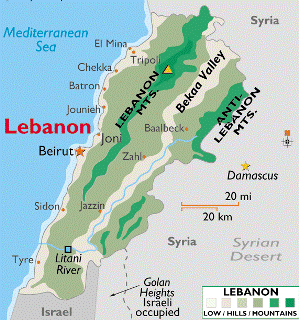
By: Mohamad Ali Harissi
Lifestyle in Lebanon seems to be shifting to an even more luxurious one. Though the national debts reached 51.5 billion U.S. dollars, fancy cars can be seen everywhere, luxurious apartments ads are occupying most of the billboards, and the tourism is expected to grow by 20 percent in 2010.
However, in Lebanon where political bickering is almost a tradition, and the situation is always fragile especially on the security side, people doubt whether this economic boom will last for a long time.
TOURISM BOOM OVERTAKING THE REGION
A country with limited industries and 14 million more expatriates, Lebanese economy depends heavily on tourism and remittance. As the country is now experiencing the most peaceful period after the war with Israel in 2006, tourism is again becoming a drive of economy.
Preliminary figures issued by the UN World Tourism Organization this month indicated that Lebanon posted the highest growth rate in tourist arrivals in the world during 2009 with a 39 percent increase from the previous year.
The number of incoming tourists to Lebanon totaled almost 2 million last year, constituting an increase of 38.9 percent from the same period in 2008. Lebanese Minister of Tourism Fadi Abboud said earlier this month that tourism activities in Lebanon would improve by 20 percent in 2010.
But Lebanese economist Elie Yachoui said he prefers “not to expect” what would hold for the tourism sector in Lebanon in the next months.
Insisting on having “more proper and world class tourism capabilities, such as warmer welcomes, cleaner sites and better infrastructure,” Yachoui believed that lower hotel prices and cheaper tourism packages for visitors will offer Lebanon a more competitive role on the regional level.
Along the favorite tourist resorts, such as national historic sites, and the flourishing nightlife attraction that offer visitors a mixture of eastern and western cultures, Lebanon is seeking to become a center for medical tourism.
International Medical Travel Journal reported last week that Lebanon is on its way to become the “hospital of the East,” trying to attract overseas customers with 11,505 physicians and 177 hospitals.
And according to a report published by the Agency for Investment Development in Lebanon (IDAL), the growth of medical tourism is expected to be around 30 percent on average between 2009 and 2011.
FEAR OF WAR WITH ISRAEL
However, as Lebanon moves forward to gain the image of a motivating tourism attraction and a reliable center for regional investments and economies, the shadow of war still looms over the country.
Tension on Lebanon’s borders with Israel has been on the rise. Israel said that the Lebanese government not Hezbollah, the Shiite armed group that own thousands of rockets, will be solely responsible for any violence on the border, as Hezbollah now holds two seats in Lebanon’s 30-seat government.
Hezbollah fought a devastating 34-day war with Israel in 2006 after abducting two Israeli soldiers on the borders. Now the Jewish state accuses the Shiite armed group of stockpiling 40,000 rockets, over twice of it owned before 2006 war.
During the more than one month Israeli devastating assault, many key infrastructures in Lebanon, such as bridges, highways, power stations, oil tanks and the only international airport, were destructed, and some 1,200 Lebanese were killed.
According to a government reports, total direct loss to Lebanon from the war were 2.8 billion dollars, which, as what former Lebanese Prime Minister Fouad Seniora said, had wiped out 15 years of economic development of the country.
“Israel threats against Lebanon aim mainly at hitting the Lebanese economy,” Lebanese retired general and strategic expert Amin Hoteit said.
Hoteit added that Israeli threats aim at putting more pressure on Lebanon in order to push it towards surrender. He said that Israel destroyed the Lebanese economy during the 1967 war.
But Abboud did not think that there will be an Israeli war on Lebanon and nothing will keep Lebanon away from working with great efforts to boost the tourism sector.
“Even UN special coordinator for Lebanon Michael Williams ruled out in February an Israeli attack on Lebanon in the near future,” said Abboud.
Yachoui says Israel is the “biggest problem to Lebanon.” He explained that Lebanon represents a serious competitor to the Jewish state, and that’s why they are trying to beat Lebanon in everything, and economy is part of that too.
SHADOW OF POLITICAL BICKERING
Along the security situation, many Lebanese fear a new round of power struggle, which has always affected the stability in the sectarian country.
In May 2008, rival Lebanese leaders inked the Doha accord in Qatar, which put an end to a 18-month-long political standoff that dragged the country to the brink of war. The accord was reached following a week of fierce clashes in Beirut between pro- government supporters and the Hezbollah-led opposition.
The latest one accrued in last year, as Saad Hariri spent almost half a year forming a national unity government which included both the majority and the opposition.
Now the government portfolios are divided as 15-10-5, which means that 15 portfolios go to the Western and Saudi-backed majority, 10 to the Syrian and Iranian-backed opposition and five to Lebanese President Michel Suleiman.
Yachoui said this kind of “power sharing agreement” can help the country avoid a more dangerous situation.
“No matter what comes, we believe that Lebanon is protected by that invisible hand,” he concluded. Xinhua

Leave a Reply
You must be logged in to post a comment.